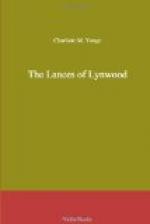“As for recompense,” said Gaston, “I should be by a long score the debtor if we came to that. If it had not been for Sir Reginald, I should be by this time a reckless freebooter, without a hope in this world or the next; if it had not been for you, these bones of mine would long since have been picked by my cousins, the Spanish wolves. But let the gold tarry in your keeping: it were better King Edward’s good crowns should not be, after all else that has been, in my hands.”
“But, Gaston, you will need fitting out for the service of Sir William Beauchamp.”
“What! What mean you, Sir Eustace?” cried Gaston. “What have I done that you should dismiss me from your followers?”
“Nay, kind Gaston, it were shame that so finished a Squire should be bound down by my poverty to be the sole follower of a banner which will never again be displayed at the head of such a band as the Lances of Lynwood.”
“No, Sir Eustace, I leave you not. Recall your brother’s words, ’Go not back to old ways and comrades,’ quoth he; and if you cast me off, what else is left for me? for having once served a banneret, no other shall have my service. Where else should I find one who would care a feather whether I am dead or alive? So there it ends—put up your pieces, or rather, give me one wherewith to purvey a new bridle for Brigliador, for the present is far from worthy of his name.”
Accordingly, the Gascon Squire still remained attached to Eustace’s service, while the trusty Englishman, John Ingram, performed the more menial offices. Time sped away at the court of Bordeaux; the gallant Du Guesclin was restored to liberty, after twice paying away his ransom for the deliverance of his less renowned brethren in captivity, and Enrique of Trastamare, returning to Castile, was once more crowned by the inhabitants. His brother Pedro, attempting to assassinate him, fell by his hand, and all the consequences of the English expedition were undone—all, save the wasting disease that preyed on England’s heir, and the desolation at the orphaned hearth of Lynwood Keep.
CHAPTER VIII
Two years had passed since the fight of Navaretta, when Sir Eustace Lynwood received, by the hands of a Knight newly arrived from England, a letter from Father Cyril, praying him to return home as soon as possible, since his sister-in-law, Dame Eleanor, was very sick, and desired to see him upon matters on which more could not be disclosed by letter.
Easily obtaining permission to leave Bordeaux, he travelled safely through France, and crossing from Brittany, at length found himself once more in Somersetshire. It was late, and fast growing dark, when he rode through Bruton; but, eager to arrive, he pushed on, though twilight had fast faded into night, and heavy clouds, laden with brief but violent showers, were drifting across the face of the moon. On they rode, in silence, save for Gaston’s execrations of the English climate, and the plashing of the horses’ feet in the miry tracks, along which, in many places, the water was rushing in torrents.




